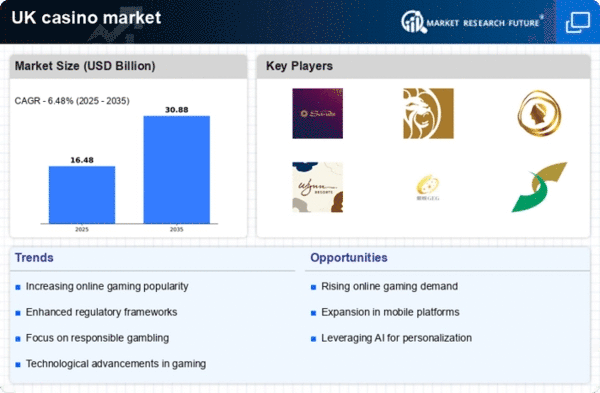Social and Cultural Influences
Social and cultural factors are increasingly shaping the casino market in the UK. The perception of gambling is evolving, with a growing emphasis on responsible gaming and community engagement. Public awareness campaigns and educational initiatives are fostering a more informed consumer base, which may influence gambling behaviors. Additionally, the integration of casinos into broader entertainment complexes is changing the way consumers perceive these establishments. As casinos position themselves as family-friendly entertainment venues, they may attract a more diverse clientele. This shift in social attitudes could lead to a transformation in the offerings and marketing strategies of casinos, ultimately impacting the overall dynamics of the casino market.
Regulatory Changes and Compliance
The casino market in the UK is currently influenced by evolving regulatory frameworks. The UK Gambling Commission has implemented stricter regulations aimed at promoting responsible gambling and ensuring consumer protection. These changes may lead to increased operational costs for casinos, as compliance with new standards often requires significant investment in technology and training. Furthermore, the introduction of new licensing requirements could limit market entry for smaller operators, potentially consolidating the market. As a result, established casinos may benefit from reduced competition, while new entrants face challenges. The ongoing regulatory scrutiny is likely to shape the landscape of the casino market, compelling operators to adapt their strategies to remain compliant and competitive.
Technological Advancements in Gaming
Technological advancements are revolutionizing the casino market in the UK. Innovations such as virtual reality (VR) and augmented reality (AR) are enhancing the gaming experience, attracting a broader audience. The integration of advanced analytics and artificial intelligence (AI) is also enabling casinos to personalize marketing efforts and improve customer engagement. As technology continues to evolve, casinos that embrace these innovations may gain a competitive edge. For instance, the implementation of cashless payment systems is becoming increasingly popular, streamlining transactions and enhancing customer convenience. The ongoing technological transformation is likely to redefine the landscape of the casino market, creating new opportunities for growth and engagement.
Consumer Preferences and Demographics
Shifts in consumer preferences are playing a pivotal role in shaping the casino market in the UK. Younger demographics, particularly millennials and Generation Z, are increasingly drawn to immersive gaming experiences that blend traditional casino offerings with innovative technology. This trend is reflected in the growing popularity of live dealer games and mobile gaming platforms. According to recent data, approximately 40% of casino market revenue is now generated from online gaming, highlighting a significant shift in consumer behavior. As these demographics prioritize convenience and engagement, casinos must adapt their offerings to meet these expectations, potentially leading to a reimagining of the traditional casino experience.
Economic Factors and Disposable Income
Economic conditions significantly impact the casino market in the UK. Fluctuations in disposable income directly influence consumer spending on entertainment, including gambling. In recent years, the UK has experienced varying economic growth rates, which have affected consumer confidence and spending habits. For instance, during periods of economic expansion, disposable income tends to rise, leading to increased patronage of casinos. Conversely, economic downturns may result in reduced spending on leisure activities. As a result, casinos must remain vigilant in monitoring economic indicators to adjust their marketing strategies and offerings accordingly. The interplay between economic factors and consumer behavior is crucial for the sustained growth of the casino market.
















